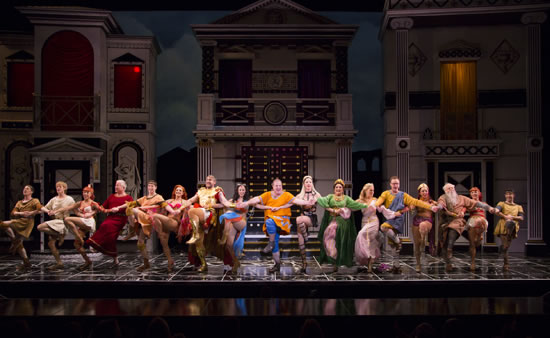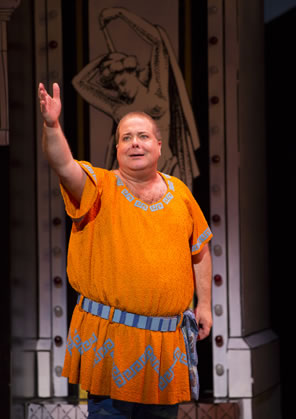A Funny Thing Happened on the Way to the Forum
He Hit Bottom, Now Dow Soars as Psuedolus
Book by Burt Shevelove and Larry Gelbart, music and lyrics by Stephen Sondheim
Shakespeare Theatre Company, Harman Hall, Washington, D.C.
Wednesday, December 4, 2013, H–108&109 (middle stalls)
Directed by Alan Paul

When the Shakespeare Theatre Company announced its 2013–2014 season last winter, it looked like a lineup intended to generate ticket sales over artistic adventure. Two shows into the season, though, that's clearly not the case. The season opened with an edgy, uncompromising Measure for Measure. Now comes the musical farce, A Funny Thing Happened on the Way to the Forum.
Sure, this is a musical, only the classical theater company's second attempt at staging a full-on musical production. It's even a Stephen Sondheim show, his first credit as both lyricist and composer. Yet, it's a perfect piece for the STC marquee in that writers Burt Shevelove and Larry Gelbart used characters straight out of the repertoire of third century Roman playwright Titus Maccius Plautus. Plautus influenced commedia del arte, and both influenced William Shakespeare. Shakespeare then influenced this production: Watch for the cynical stabs at Hamlet, Macbeth, and Richard III during the opening production number, "Comedy Tonight."
Shevelove and Gelbart were so dedicated to maintaining Plautus' characters that Sondheim later likened their script to "a senior thesis on two thousand years of comedy." Though Shevelove and Gelbart had built their careers on being great joke writers, their main contribution, they claimed, was to create the plot. "The plotting is intricate, the dialogue is never anachronistic, and there are only two or three jokes—the rest is comic situation," Sondheim wrote (the above-mentioned Shakespeare references are insertions in this production).
Thus endeth any and all academic posturing about this play and this production. "Comedy Tonight" is not only the opening song, it is the credo for director Alan Paul (helming his first STC main-stage production) and his cast and crew, and they hew to that standard all the way to the closing reprise of "Comedy Tonight." This is a production with babies being tossed about, cross-dressing, dumb blondes, eunuchs, and a woman conducting the nine-piece orchestra with her breasts.
Most of all, though, it is Bruce Dow as Pseudolus, a role originated by Zero Mostel, who won one of the original 1962 Broadway production's six Tony awards (out of eight nominations), and subsequently played by Frank Howerd (in London), Phil Silvers (who also won a Tony), Nathan Lane (yes, another Tony), and Whoopi Goldberg. Dow, a longtime Shakespearean veteran of Canada's Stratford Festival (where he played Pseudolus in 2010), made his Washington, D.C., debut on this stage a year ago as Bottom in Shakespeare's A Midsummer Night's Dream. "He doesn't chew the scenery; he becomes the scenery," I wrote then of his Bottom.
In Forum, he doesn't make the play; he is the play. When Sondheim says "there are only two or three jokes" in the script, he may be right; but this production has dozens upon dozens as Dow goes way off-script over the course of the play. This farce is, in fact, unmasked commedia del arte, with all that theatrical form's improvisational conventions. Dow interacts directly with the audience: The gag with the many baby dolls flying about ends with Dow handing one to a member of the audience to hold for much of the play until he has a need for it late in the second act. He comments on gaffes: Unable to pick Hysterium's pocket on stage, he follows fellow actor Tom Story off-stage, we hear a yelp, and Dow returns laughing; "That worked better in rehearsal," he says. He comments on miscarried jokes: Pseudolus orders the dumb blonde virgin Philia (Lora Lee Gayer) to hide "behind that large clump of myrrh!" "You will tell me when he comes?" she asks. "Don't we always?" Pseudolus replies, garnering no response from the audience; after he gets Philia into the garden, Dow murmurs, "I don't write the script."
His tour de force moment comes when Pseudolus thinks he's drinking a death-like sleeping potion but it is actually a sex potion—Viagra for the whole body. "Dies noisily and elaborately," says the original stage direction. Dow turns that direction into a rambling piece of improv that is equal parts Robin Williams, Billy Crystal, Curly and Schemp, and Dow. The rest of the cast give in to a fit of corpsing, some not even trying to hide their laughter.
How much all of these interjections by Dow are on-the-fly moments or carefully rehearsed—despite his testament to the contrary—doesn't matter. It all seems spontaneous, and that is what turns a fun but dated farce and pleasant-enough musical into a night of laugh-filled theater.

Bruce Dow as Pseudolus in the Shakespeare Theatre Company production of A Funny Thing Happened on the Way to the Forum at Sidney Harman Hall. Top, the whole cast lines up as they sing the production number "Comedy Tonight" on the James Noone–designed set. Photos by T. Charles Erickson, Shakespeare Theatre Company.
He is ably aided by his fellow comic actors. Especially funny is Gayer as Philia, the virgin who is the plot's centerpiece, as Psuedolus, acting on behalf of his master Hero (Nick Verina), tries to pry her from the whorehouse and out of her contract with Captain Miles Gloriosus. Gayer turns dumb into an art form as she stares out toward the audience trying to count to three. Talk about a pretty house with nobody home: this house has no lights, no furniture, no appliances, no paint—no walls. She's just a facade, and so skilled is Gayer at playing this endearing vacancy that her mere appearance on stage sparks laughs. Edward Watts is a vainglorious Miles Gloriosus; he so securely occupies the center of his universe with such charm we can't help yielding him his place. Credit some of his character to costume designer David C. Woolard, who gives the captain quite a set of thighs.
Matching Dow in farcical exuberance are the three Proteans: Matthew Bauman, Nick Flatto, and Blakely Slaybaugh. "Only three, yet they do the work of 30," Pseudolus as the Prologue says. "They are difficult to recognize in the many parts they play, so watch them closely." Indeed, when these sometimes pirates and Roman soldiers and Roman servants appear as the Roman eunuchs with huge protruded bare bellies, you likely won't recognize them (nice prosthetic work). They even play a Roman numeral at one point.
That numeral comes during the opening number. Pseudolus and the Proteans singing Sondheim's lyrics (with a few interpolations of Dow's own) raise the farce flag right at the outset. The characters are stock, but they are the original stock created by Plautus. Much of the comedy is old-fashioned burlesque. Except for Philia and Hero's mother Domina (in a nomenclature-worthy performance from Julie Johnson), the female cast members are all scantily clad courtesans; the parading of their wares for Pseudolus and Hero is an excuse to present four striptease acts (including one by twins)—not for the feminists at heart. As for the musical compositions, Sondheim's lyrics are clever, but the tunes don't leave much of an impression.
Dow leaves an impression. Gayer, Watts, Story, and Johnson leave an impression. The Proteans leave an impression. And Paul makes an impressive first impression by corralling all this comic talent, shaping this musical farce around the company's Shakespearean sensibilities, and staging a great comedy, tonight and any night.
Eric Minton
December 11, 2013
Comment: e-mail [email protected]
Start a discussion in the Bardroom



 Find additional Shakespeareances
Find additional Shakespeareances